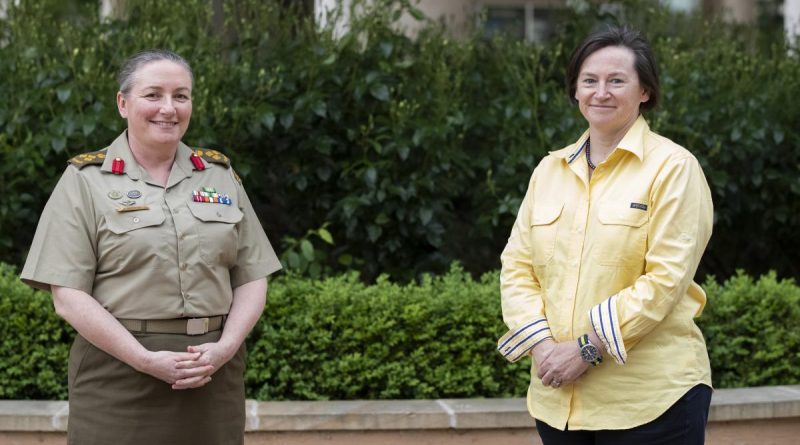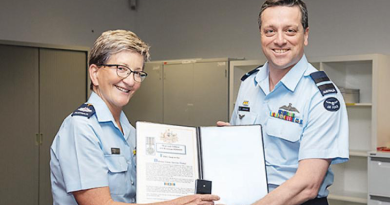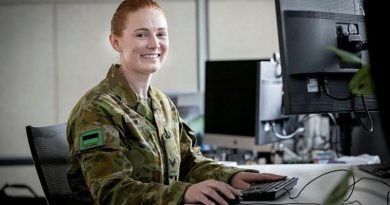Reducing gender-based violence

Attending personnel learned about Defence’s work in reducing gender-based violence and providing support to victims at a virtual seminar on November 25.
CAPTION: Deputy Head of the Joint Support Services Division Brigadier Nicole Longley with Gender, Peace and Security Director Captain (RAN) Jennifer Macklin. Story by Leading Seaman Kylie Jagiello. Photo by Kym Smith.
The seminar coincided with International Day for the Elimination of Violence against Women.
Speakers included Melissa Elfverson, of the Domestic Violence Crisis Centre, the manager of Defence’s Family and Domestic Violence Prevention Program Myra Keating and head of ADF Gender Peace and Security Directorate Captain Jennifer Macklin.
This year’s theme was “Orange the world: End violence against women now!”
Captain Macklin said there were many links between the day and recognising that gender was central to understanding conflict-affected, disaster and fragile settings.
“It mustn’t be an afterthought,” Captain Macklin said.
“It is absolutely central to the ADF response, in terms of operational planning and mission effectiveness.
“We need to understand the human terrain; where gender inequality exists and how it will manifest through social and cultural norms. Understanding the pattern of life and its inherent vulnerabilities must shape our response.”
Since 1981, women’s rights activists have observed November 25 as a day to take a stand against gender-based violence.
The date honoured the Mirabal sisters, Dominican political activists murdered on the orders of the country’s dictator, Rafael Trujillo, in 1960.
In 1993, the UN General Assembly adopted the Declaration on the Elimination of Violence against Women, aiming to eradicate violence against women and girls worldwide.
In 2000, the UN General Assembly designated November 25 as the International day for the Elimination of Violence against Women.
Defence has supported the day since 2019 and Captain Macklin’s directorate, supported by Service Gender Advisors and Gender Focal Points, aims to ensure ADF personnel deployed to fragile, disaster and conflict-affected environments are educated on the United Nations Security Council Resolution (UNSCR) 1325 on Women, Peace and Security agenda and given tools to help them apply a gender perspective.
An event was live streamed from Canberra on November 25 and information on attendance (virtual or in-person) is available via the Defence intranet site.
For ADF members affected by family and domestic violence, you can get help from the following:
- Defence Member and Family Support, Joint Health Command, and through your respective service chaplains.
- The Defence Member and Family Helpline – for advice, intervention and referral for personnel and their families dealing with family and domestic violence – 1800 624 608.
- The Employee Assistance Program helpline – a 24/7 counselling service for Defence APS, cadets and reservists and their immediate family – 1300 687 327.
- Converge International’s DEDJTR Family Violence Support Helpline – 1300 545 232 (during business hours).
- SeMPRO for immediate and confidential support, information, and advice to current and ex-serving Defence personnel and their families who have been impacted by sexual misconduct – 1800 736 776 (1800 SeMPRO) 24/7.
- 1800RESPECT is the national sexual assault, domestic and family violence counselling service.
.
.

.
.





